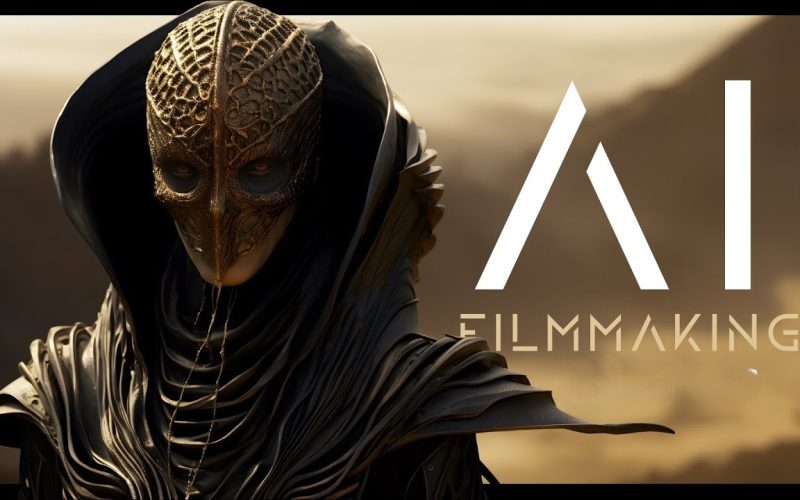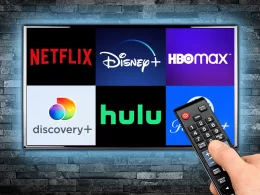Introduction
Filmmaking has always used new technology to improve how movies are made. From adding sound to films to switching from film to digital cameras, each new tool has changed the industry. Today, a new technology is transforming filmmaking: artificial intelligence (AI). AI is not just another tool; it’s becoming a key part of the creative process. In this article, we’ll look at how AI is shaping filmmaking and what it means for the future of cinema.
AI’s Role in Cinematic Creation
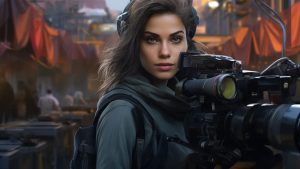
AI is being used in many parts of filmmaking, from the start of the project to the final edits. It’s helping filmmakers be more creative, saving time, and making the entire process more efficient. AI doesn’t replace the creativity of filmmakers but works alongside them, offering new ways to tell stories, manage production, and improve the final product.
1. AI in Storytelling and Scriptwriting
AI is now helping with storytelling. It can analyze lots of data, like past movies, audience trends, and popular genres, to suggest ideas for stories, characters, and settings. AI tools like ChatGPT and ScriptAI are helping screenwriters by suggesting dialogue, improving scenes, and even assisting with the overall plot. These tools are not taking over the writing process but offering support and creative ideas.
2. AI in Casting and Production
AI is also changing the casting process. It can analyze an actor’s past roles, popularity, and social media activity to help filmmakers choose the best person for a role. AI is also helping with production planning by optimizing schedules, budgets, and location choices. This saves time and lets filmmakers focus more on the creative side of making the film.
AI’s Impact on Filming
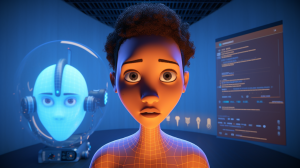
Filming itself is benefiting from AI. One of the biggest impacts is on visual effects (VFX). AI-powered tools are now able to create realistic CGI environments, simulate weather, and even make digital characters that look like real actors. This means filmmakers can make more ambitious scenes without needing huge budgets or physical sets.
AI in Cinematography
AI is also helping with the camera work. AI cameras can analyze a scene and automatically adjust lighting, focus, and angles to get the best shot. These smart cameras can even predict what shot will work best based on the script, making the filming process faster and easier.
AI in Post-Production
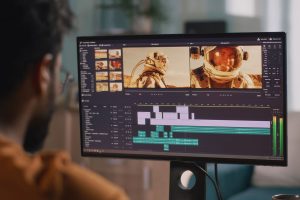
After filming, AI is transforming the editing and sound design stages. AI tools can quickly analyze hours of footage and help choose the best shots. They can even create rough cuts, saving editors a lot of time. This allows editors to focus on perfecting the story and flow of the film.
AI in Music and Sound
AI is also changing how music and sound are made for films. AI software can compose original music, generate sound effects, and synchronize sound with scenes. This helps filmmakers experiment with different sounds quickly, finding the right one for each moment in the film.
What’s Next for AI in Filmmaking?

As AI continues to improve, its role in filmmaking will grow. In the future, we might see AI helping with everything from generating full scripts to creating highly realistic characters and backgrounds. Filmmakers will rely on AI not just to save time and money but also to push the limits of what they can create.
Ethical Issues: How Much Should AI Do?
While AI is opening up new possibilities, it also raises important questions. How much of a film can be made by machines? Will AI replace human filmmakers? These are issues the industry needs to consider. As AI becomes more advanced, it’s important to make sure that technology enhances creativity instead of replacing it.
AI and Filmmaking Efficiency
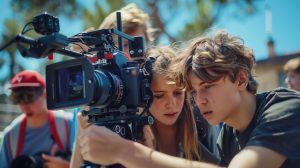
AI makes the filmmaking process faster. Tasks that used to take a lot of time, like sorting through footage or deciding on camera angles, can now be done by AI in just a few moments. This allows filmmakers to work more efficiently and focus on the creative aspects of their films. By speeding up these tasks, AI helps save time and reduces stress on the production team.
AI and Improving Film Quality
One of the most exciting things about AI is how it can improve the quality of a film. AI can help create stunning visuals by improving color correction, enhancing images, and refining sound. It can also help polish rough cuts, making sure that the final film looks and sounds as good as possible. AI can even help correct mistakes made during filming, making sure everything looks perfect.
AI’s Role in Personalizing Content
AI is also helping filmmakers create content that appeals to different audiences. By analyzing data about viewer preferences, AI can suggest changes to make the film more relatable to certain groups of people. This means filmmakers can personalize content to different regions, cultures, or age groups, making the film more engaging for a wider audience.
AI and Low-Budget Filmmaking

Making films on a tight budget can be challenging. However, AI is making it easier for filmmakers to produce high-quality films without spending a lot of money. With AI tools, filmmakers can create realistic special effects, improve sound design, and even handle editing with limited resources. This makes it possible for independent filmmakers to compete with big studios, bringing fresh ideas to the screen.
AI and Film Distribution
AI is also changing how films are distributed and marketed. AI can predict which types of movies will do well with different audiences, helping filmmakers and distributors target the right viewers. AI can also help with the creation of movie trailers and social media content by analyzing what has worked best in the past. This can lead to more effective promotion and better box office results.
AI and the Creative Process
While AI can do many tasks, the creative vision of filmmakers still leads the way. AI tools assist filmmakers in reaching their ideas faster and more effectively, but the heart of a film is still created by people. AI might help suggest new ideas or help with the technical side, but human imagination and emotion are what truly make films special. AI and human creativity will work together to bring new and exciting stories to life in the future.
AI and Script Rewriting
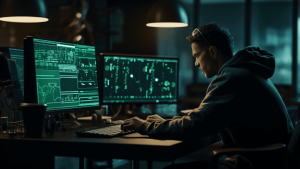
AI can help rewrite scripts to make them stronger. If a scene doesn’t work well or dialogue feels off, AI can suggest changes. This allows writers to quickly try different ideas and see what works best. AI doesn’t replace the writer’s role but provides options and improvements, helping the creative team find the perfect version of the script faster.
AI and Film Marketing
Marketing a film is important to ensure people know about it. AI helps by analyzing which type of content works best for different audiences. It can suggest how to advertise a film on social media or what type of trailer would catch people’s attention. This helps filmmakers reach the right audience and create effective marketing campaigns.
AI and Virtual Characters
In filmmaking, AI is also used to create virtual characters. These characters, which are completely digital, can perform in movies just like real actors. AI helps make these characters look and act more naturally. As technology improves, we may see more films using virtual actors, making it possible to create any character without needing a human actor.
AI and the Editing Process
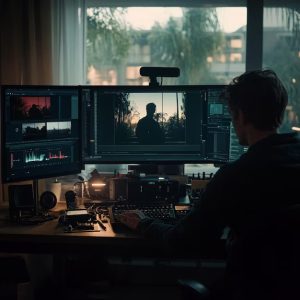
Editing a film can take a long time, but AI is changing that. AI can go through hours of film and select the best clips. It can even suggest changes to improve the pacing of the movie. This makes the editing process faster, so filmmakers have more time to focus on the creative parts of making the film. AI doesn’t replace editors, but it makes their job easier.
AI and Audience Feedback
AI can also analyze audience feedback from test screenings or social media to improve a film. It can gather information about what audiences liked or didn’t like and suggest changes. This gives filmmakers valuable insight into what works with viewers and allows them to make adjustments before the film is released, ensuring it’s more likely to succeed with the public.
The Challenges of AI in Filmmaking
While AI brings many benefits, it also has challenges. Some worry that AI could take away jobs from human filmmakers. Others believe that too much reliance on AI might make films feel less personal or creative. It’s important to find a balance where AI helps but doesn’t replace the human touch in filmmaking.
The Future of AI in Filmmaking

Looking ahead, AI will continue to grow in filmmaking. We might see AI helping even more with storytelling, visual effects, and creating realistic characters. As the technology improves, it could change how movies are made completely. Filmmakers will need to use AI wisely, making sure it enhances their work without losing the magic of human creativity.
Comparative Table: Traditional Filmmaking vs. AI Filmmaking
| Aspect | Traditional Filmmaking | AI Filmmaking |
|---|---|---|
| Scriptwriting | Writers create the story. | AI helps with ideas, dialogue, and structure. |
| Casting | Actors are chosen by the director. | AI suggests actors based on data. |
| Production Planning | Planning is done manually. | AI helps with scheduling and budgeting. |
| Visual Effects (VFX) | Effects are created manually. | AI creates realistic CGI and digital characters. |
| Editing | Editors choose the best shots. | AI picks the best shots and creates rough cuts. |
| Sound Design | Musicians and sound designers create the music. | AI generates music and sound effects. |
Analysis Table: Benefits and Challenges of AI in Filmmaking
| Benefits | Challenges |
|---|---|
| AI speeds up the filmmaking process. | AI might lack the emotional depth of human-created work. |
| It cuts production costs by streamlining workflows. | AI could reduce the role of traditional filmmakers. |
| It offers new creative tools for filmmakers. | Relying too much on AI could lead to less originality. |
| It improves VFX and sound design. | Concerns about AI taking over jobs in the industry. |
| It can analyze data to help personalize content. | Privacy concerns with data used by AI tools. |
Conclusion
AI is leading a new wave in filmmaking. It’s not replacing human creators but giving them more tools to tell better stories and make films faster. As AI continues to improve, we’ll see more innovation in how films are made, from scriptwriting to the final edits.
The film industry can benefit greatly from AI’s ability to save time and money while offering new creative possibilities. However, it’s important for filmmakers to keep the balance between technology and human creativity. AI should be seen as a tool to help filmmakers, not as something that replaces the passion and artistry that make films great.
In the years to come, AI will continue to shape the way movies are made, offering fresh opportunities for creativity and storytelling that we’ve never seen before.






